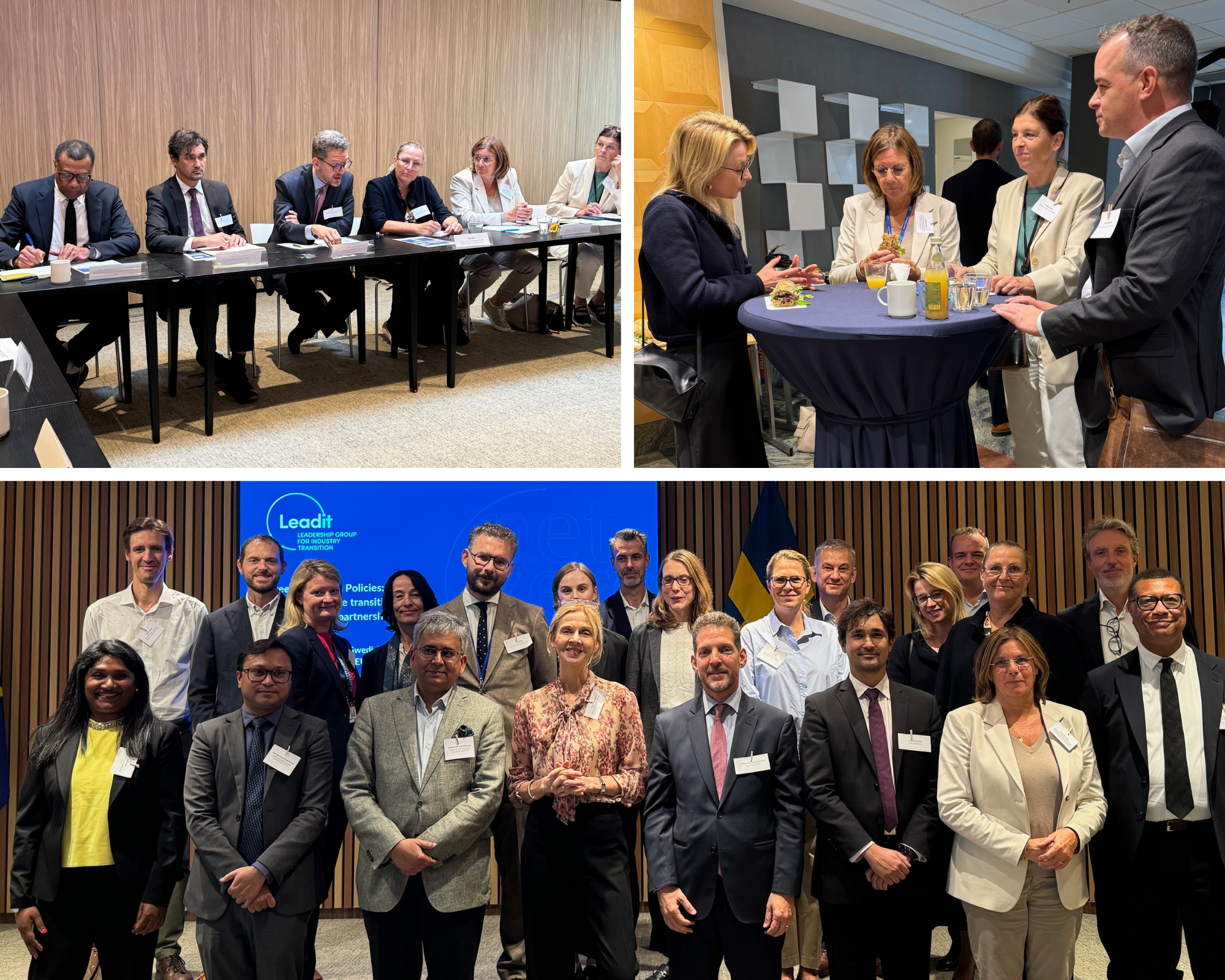LeadIT Roundtable on Inclusive Green Industrial Policy.
On September 10, the Secretariat for the Leadership Group for Industry Transition (LeadIT) convened a high-level roundtable at Sweden’s Permanent Representation to the EU in Brussels. The event, which was organised with the support of the Mistra Geopolitics Research programme, brought together government officials, industry leaders, and representatives from emerging markets and developed economies, and experts to discuss the role of inclusive green industrial policies in decarbonizing heavy industries. Participants included members of the European Parliament, Ambassadors from Brazil, India, and Sweden, organizations like the Organization of African, Caribbean and Pacific States (OACPS), companies, industry associations, and research and policy institutes.
The discussion focused on the urgency of decarbonizing high-emission industries, which is critical to meeting global climate targets. The discussion emphasized the need for inclusive and fair green industrial policies that balance economic competitiveness with meeting global climate goals and supporting equitable integration into green value chains.
“We must ensure that green industrial policies support all countries, particularly emerging and developing ones, in their industrial transition. LeadIT provides an important platform for such a dialogue, for partnership and collaboration, for knowledge and experience sharing, as well as for technological co-operation."
Ambassador Karin Eckerdal
Deputy Permanent Representative of Sweden to the European Union
Key Points
- Leadership and Vision: The participants stressed the importance of strong political leadership in fostering the impressive advances we have seen in industrial decarbonisation, especially over the past 5 years. Political leadership, robust regulatory frameworks, and public-private collaboration have been key to driving industrial decarbonization efforts. At the same time, it was emphasized that we are still in the early stages of this transition, and that technological solutions must be scaled globally rather than limited to isolated projects or advanced economies.
- Competitiveness vs. Climate Goals: One central topic was the balance between countries’ competitive concerns and global climate goals. Advanced economies, emerging markets and developing economies are implementing green industrial policies to secure energy independence, boost competitiveness, and take advantage of resources critical to green transitions. Some participants observed that retaliatory trade policies could fragment global trade as formerly open economies increasingly seek to protect domestic industries. These policies have also raised concerns about uneven participation in the green transition, particularly for emerging markets and developing economies (EMDEs). There is a prospect that the green technology gap could widen further due to the large levels of financial support advanced economies are providing to their domestic green industries combined with protective trade measures and the leverage major economies have on global markets. .
- Fairness and Climate Finance: Participants discussed the need for fair policies and building partnerships that recognize the differences in historical and current emissions levels in different regions. Access to climate financing and especially measures to address the high cost of capital in EMDEs were identified as key to facilitating investments in green industries, which are often capital-intensive.
- Critical Materials and Renewable Energy: The need for critical materials and renewable energy in the green transition was highlighted. tThe risk of repeating patterns of commodity export dependency in EMDEs was raised and there was an emphasis on the importance of ensuring these countries benefit equitably from the resources they provide. There were calls for more equitable partnerships that prioritize development objectives in EMDEs and foster their integration higher up in green value chains.
- Partnerships and Cooperation: A significant part of the discussion revolved around avoiding a two-track transition, where advanced economies move ahead while EMDEs fall behind due to a lack of resources, support, or equal opportunities. The participants emphasized that cooperation between countries, particularly through fair trade conditions and global partnerships, is essential to building trust and achieving global climate targets.
- Potential to encourage inclusive green industrial policy: Some building blocks for policy options that could support countries to navigate legitimate competitiveness and energy security concerns and the need for mutually beneficial partnerships were discussed . These focused on: technology cooperation and access through preferential licensing, results-based mitigation impact funding that includes the global mitigation potential of green energy and green industrial exports from EMDEs, comprehensive green industrial partnerships on energy, industry, and critical materials that align with domestic green industrial goals in key EMDEs, expanding multi-stakeholder country platforms such as Just Energy Transition Partnerships, and generating new climate finance streams, for example through the recycling and allocation of revenue from the EU’s Carbon Border Adjustment Mechanism to support industry transition in EMDEs.
Conclusion
The roundtable underscored the urgency of taking decisive action within the next decade and that the race to decarbonize industry must be globally inclusive. While competitiveness and energy security are important and legitimate near-term issues, the overarching challenge is to cut emissions drastically. This can only be achieved through fair cooperation and partnerships that build on each country’s strengths and ensure no nation is left behind in the green industrial transition.
This roundtable represents an important step in shaping policies that not only address industrial decarbonization but also promote a just, equitable transition for all countries.
This text is a summary of the discussions that took place on 10 September but does not necessarily reflect the views of everyone present, nor should it be taken as a reflection of LeadIT’s position
"Availability of appropriate technology and finance at reasonable cost are critical for high emissions industries transitioning to greener paths and LeadIT's focus on this in its second phase is important for the initiative's success. For industry transition to be successful, it is also important that regulatory regimes are designed with the interests of emerging economies and developing countries in mind"
Ambassador Saurabh Kumar
Embassy of India to Brussels, Luxembourg, & the European Union

